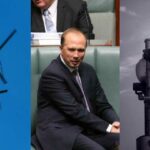Multiple National Security Bills Facilitate Dutton’s ASD Domestic Target Wet Dream

News Corp exposed the content of some leaked correspondence in April 2018 that involved home affairs secretary Mike Pezzullo and defence secretary Greg Moriarty spitballing the idea of turning international spying agency the Australian Signals Directorate (ASD) on domestic targets.
Pezzullo, Moriarty and then ASD head Mike Burgess released a joint statement straight after denying the claim. “The cyber security function entails protecting Australians from cyber-enabled crime and cyber-attacks, and not collecting intelligence on Australians,” the senior public servants assured.
Home affairs minister Peter Dutton also refuted the claim but said the ASD spying internally was a good idea. He then appeared on the ABC in July 2019 to again deny the proposal existed but also suggested it would be advantageous and the nation should have a “sensible discussion” about it.
Dutton was dismissing the claim a second time, as the month prior to his appearance, the AFP had raided journalist Annika Smethurst’s home in relation to her publishing the content of the leaked documents. This was an attempt to catch the whistleblower, as well as to send a warning to all.
But most of the confusion around the proposal that obviously was being discussed by the two departmental secretaries was put to an end when Dutton told the ABC in early 2020 that the Morrison government’s plan to turn the ASD on its own citizens was almost to fruition.
So, two years later, the question is, where is Dutton’s promised ADS domestic spying regime?
Well, if you thumb through a few recently passed pieces of federal national security legislation, you’ll find it’s already in action and it’s expanding.
Blurring the lines
The ASD was established in 1947, as the chief foreign intelligence collection agency dealing with signals intelligence, military operations, and increasingly as technology has developed, cyber security.
It also plays a key role in gathering intelligence in Asia on behalf of the Five Eyes security alliance.
Civil Liberties Australia (CLA) president Bill Rowlings told Sydney Criminal Lawyers at the time of the Smethurst revelations that the ASD’s mandate only permitted the collecting of intelligence overseas, and while this could involve Australians abroad, as soon as they return, the spying has to cease.
“This is the so-called onshore/offshore distinction, and it is meant to protect the privacy of Australians and to maintain the critical distinction between ordinary policing and defence and spy agencies,” explained the civil liberties advocate.
And according to Rowlings, it was the formation of the Home Affairs Department in December 2017 that lead to the Australian Signals Directorate proposal, as this super-ministry blurs the line between policing and spying, due to its overseeing of the AFP and ASIO, as well as having cybersecurity links to the ASD.
Indeed, while the Australian Federal Police and the domestic spying agency ASIO need a warrant from a higher authority to surveil onshore targets, the leaked documents saw Pezzullo suggesting the ASD may be able to avoid this requirement.
The eyes turn inward
Civil liberties advocates have long been warning that the now 90-odd pieces of national security/counterterrorism legislation that have been passed at the federal level since 9/11 have been slowly eroding the rights of all citizens and residents.
And in a similar manner, some of the recently passed security bills can be seen incrementally facilitating an ASD role in the domestic sphere, without the need to overtly legislate a bill with its primary focus being turning the foreign spying agency on the citizenry.
The first such piece of legislation that began blurring the onshore/offshore distinction is commonly referred to as the TOLA Act. Passed in late 2018, just months after the Smethurst revelations, this Act establishes a framework to gain access to encrypted messaging systems.
The TOLA Act sets up a three-tiered system to gain access into the encrypted messages and systems of designated communications providers. The first tier is a voluntary request for assistance, the next two see providers being required to follow an access order.
The laws that involve the ASD are requests for voluntary assistance, under a technical assistance request, which ask providers to “do a thing currently within their capacity, or… build a new capability to assist” the agency in terms of any national security or law enforcement needs.
Presumably the ASD is requesting this in an international context, rather than requiring it in the domestic sphere, but it’s also likely, at least in some cases, that the information to be decrypted or accessed is coming from within Australia and, therefore, technically surveilling a domestic target.
ASD hacking assistance
The Identify and Disrupt Bill passed federal parliament in August last year, and despite Dutton already having taken over the defence portfolio, the minister had drafted and introduced this legislation before he vacated his home affairs role.
This bill provides a three-tiered warrant system that serves to permit AFP and Australian Criminal Intelligence Commission agents to add, copy, alter or delete data on an electronic device, trawl through an online account for evidence, or take over such an account, whilst locking out the owner.
If these powers don’t sound invasive enough, the domestic agencies are then permitted to call on the Australian Signals Directorate for help in infiltrating citizens and residents online accounts and electronic devices.
The bill’s explanatory memorandum sets out that, “If an ASD officer is seconded to the AFP or the ACIC, they would only have access to the powers and functions of an AFP or ACIC staff member, and not those available to an ASD staff member.”
However, this arrangement begs the question, if an ASD officer only has the powers of a regular AFP or ACIC agent in hacking into citizens’ devices and online accounts, why is their assistance is needed at all?
A domestic powers bonanza
The latest piece of legislation that progresses the creep of the ASD into the domestic sphere is a recently passed national security amendment produced by new home affairs minister Karen Andrews, which goes a long way to removing ministerial oversight relating to intelligence agencies.
This bill permits an ASD agent, under ministerial approval, to produce intelligence on an Australian person who’s involved with or taken to be involved with a listed terrorist organisation while they’re on Australia territory. This connection can be as vague as providing financial support or advocacy.
Andrew’s new law also empowers the defence minister to authorise an ASD agent to produce intelligence on an Australian person when acting in support of the AFP. This ASD ability to spy on a citizen or resident also applies to when they’re on Australian soil.
And the legislation further goes as far as to include ASD agents in the assumed identity regime contained in part IAC of the Crimes Act 1914 (Cth). This means these international spies can now operate in Australia producing intelligence on citizens, whilst they use a fake identity.
So, it seems that with these latest laws, the new home affairs minister has realised the dream of her predecessor in allowing the ASD to operate domestically.
And as Rowlings warned back in 2020, our spies have now effectively turned “into the secret police of authoritarian regimes”.
Image: “Peter Dutton” by thecameramatt is licensed under CC BY-SA 2.0







